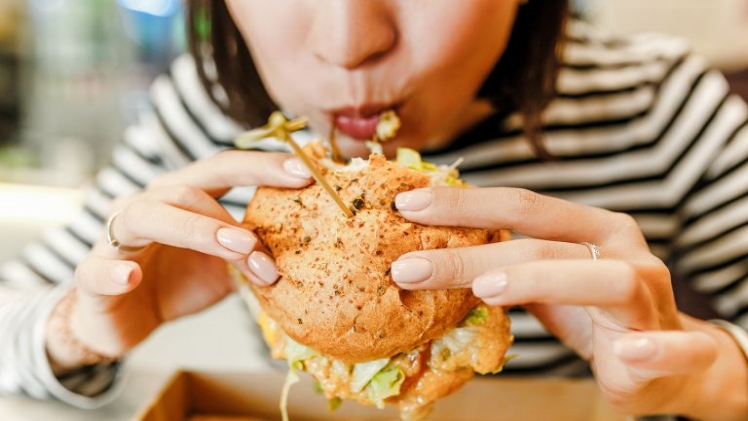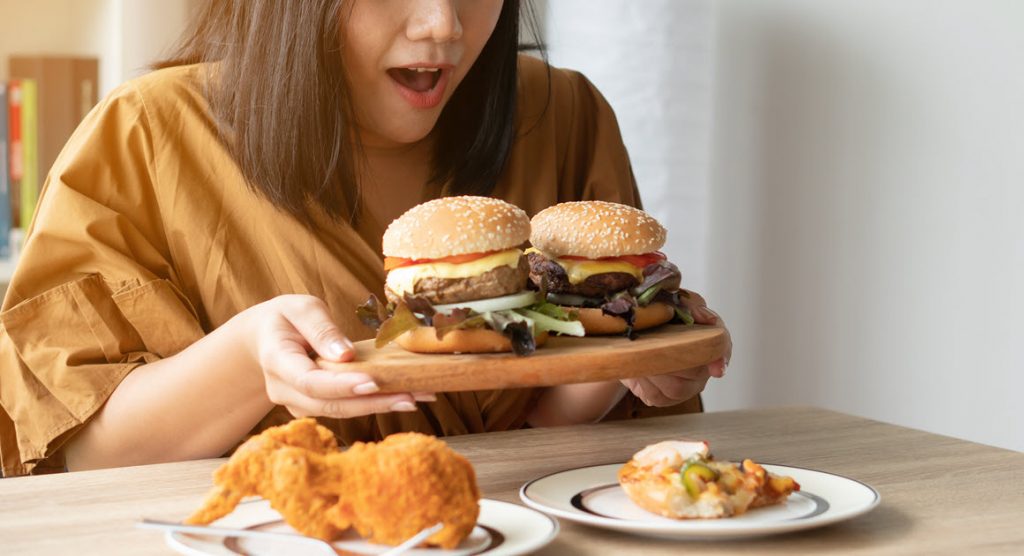The relationship between emotions and eating habits is deeply rooted in our biology and psychology. Throughout human history, food has not only been a source of nutrition but also of comfort. For many, food has been a balm to soothe emotional wounds, a reward in times of joy, or a refuge from the storms of life. But when the balance tips, and we find ourselves reaching for comfort food more often than not, it can lead to weight gain and a strained relationship with our bodies. Emotional eating can hinder weight loss goals, impacting not only our physical health but also our emotional well-being. Here’s an in-depth look at why this happens and strategies to manage stress-related overeating.
The Connection Between Stress and Overeating

source: pinterest.com
For many, stress is the key culprit behind overeating. When faced with challenging situations, our bodies produce more of the hormone cortisol. Cortisol increases appetite and may also ramp up the motivation to eat. The allure of junk food during such times isn’t just in our heads. High-calorie, sugar-laden, and fatty foods can stimulate the brain to release feel-good chemicals like serotonin. And thus, that pint of ice cream or bag of chips becomes our go-to remedy for emotional relief. Amidst the many products in the market that claim to curb these cravings, there’s one that stands out: slim gummies from SkinnyFit. They are designed to help manage the overwhelming urge to munch and make healthier dietary choices.
Yet, the repercussions of succumbing to these urges often involve guilt, further emotional distress, and unwanted weight gain. So, how can one manage this cycle?
Mindfulness: The First Line of Defense
Mindfulness, or the act of being present in the moment, can be a potent tool against emotional eating and aid in weight management. When we eat mindfully, we savor each bite, are aware of our hunger and fullness cues, and importantly, we become conscious of why we’re eating.
By practicing mindfulness, individuals can discern whether they’re genuinely hungry or just eating in response to an emotional trigger. Pausing for a moment before reaching for that snack, taking a deep breath, and evaluating the reasons behind the urge can be illuminating. If you recognize that it’s stress pushing you towards food, try engaging in another activity you enjoy. Whether it’s reading a book, listening to music, or going for a walk, diverting your attention can halt the immediate impulse to eat.
Creating Emotional Coping Strategies

source: pinterest.com
While mindfulness can be a great tool for in-the-moment decisions, it’s equally crucial to have coping strategies for emotional triggers. These strategies should ideally provide comfort, relief, or distraction without involving food.
For instance, maintaining a journal can be therapeutic for many. Writing down feelings can offer clarity, and over time, you can detect patterns in emotional eating and preemptively counter them. Similarly, physical activity can be an excellent stress reliever. Whether it’s yoga, aerobics, or just dancing to your favorite tunes, find what suits you and make it a part of your routine.
Connecting with others, whether it’s friends, family, or support groups, can also be immensely beneficial. Sharing your challenges, getting advice, or merely venting can make a world of difference in managing emotional stress without resorting to overeating.
Establishing Healthy Eating Habits
Combatting emotional eating isn’t just about avoiding food during times of stress; it’s also about fostering a healthy relationship with food at all times. Balanced, regular meals can help stabilize blood sugar levels, making you less prone to sudden cravings. Including a variety of nutrient-dense foods in your diet ensures you’re nourished, and your body isn’t sending hunger signals merely due to a lack of essential nutrients.
Furthermore, when you do want to indulge, do so without guilt but with awareness. If you wish to have that piece of chocolate cake, have it, savor it, enjoy it, but recognize it for what it is – a treat, not a therapy.
Seeking Professional Guidance

source: pinterest.com
Sometimes, the depth of emotional eating can stem from deep-seated traumas or issues that require professional intervention. There’s no shame in seeking help. A therapist or counselor can offer coping strategies, provide support, and help you navigate through the complexities of your relationship with food.
Understanding the Emotional Spectrum of Eating
Emotional eating isn’t confined to just negative emotions like stress, sadness, or anger. Even moments of celebration, happiness, or nostalgia can drive us toward specific foods. For instance, many people associate birthdays with cake or associate certain dishes with fond childhood memories. Distinguishing the wide range of emotions that lead us to eat helps tailor our strategies in response.
Reframing Your Food Narratives
From a young age, many are conditioned with food narratives. Phrases like “eat this, you’ll feel better” or “don’t waste food, think of those who are hungry” program our minds to create associations that can lead to overeating later in life. It’s essential to recognize these narratives and challenge them. When faced with the urge to eat due to an emotional trigger, question it. Ask yourself, “Am I eating this because I’m truly hungry or because of an ingrained belief?” Such introspection can create a mental shift over time.
Creating a Supportive Environment

source: pinterest.com
Your surroundings play a significant role in your eating habits. A kitchen stocked with high-calorie snacks and processed foods can make it easier to succumb to emotional eating. On the other hand, an environment with healthier alternatives can encourage better choices.
It’s not just about eliminating temptations; it’s about having easy access to nutritious foods. Keeping pre-cut veggies or fruits in the fridge, or nuts and seeds within arm’s reach, can be beneficial when hunger strikes. Over time, when the initial craving is for a wholesome snack rather than a sugary treat, it’s a win.
Harness the Power of Visualization
Visualization isn’t merely a tool for athletes or performers; it can be handy for anyone trying to manage emotional eating. When the urge to eat out of emotion arises, take a moment to visualize the aftermath. How will you feel after consuming that comfort food? Will it truly address the emotion you’re feeling? More often than not, the brief satisfaction is followed by guilt or physical discomfort. By visualizing the entire sequence, from the craving to post-consumption feelings, you can create a deterrent for yourself.
Empathy and Self-compassion

source: pinterest.com
No journey is linear, and there will be moments of regression. During these times, it’s crucial to approach the situation with empathy and self-compassion. Berating oneself for a moment of weakness can lead to further emotional eating. Instead, acknowledge the lapse, understand its causes, and plan to navigate such situations better in the future. This compassionate approach not only reduces guilt but also empowers individuals to believe in their ability to change.
Towards a Balanced Relationship with Food
Emotional eating is a multifaceted challenge, entwined in the intricate weave of our psyche, habits, and environment. Recognizing it is the first step. By practicing mindfulness, building coping mechanisms, fostering healthy eating habits, and seeking support when necessary, we can find our way back to a balanced relationship with food, where it’s both nourishment and occasional comfort, without being an emotional crutch.
In our journey towards holistic well-being, both physical and emotional, understanding and managing stress-related overeating can pave the way for not just weight loss but also enhanced self-awareness and inner harmony.




